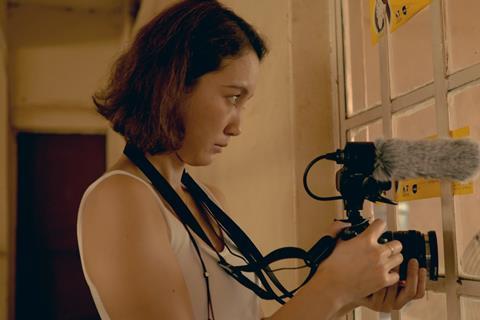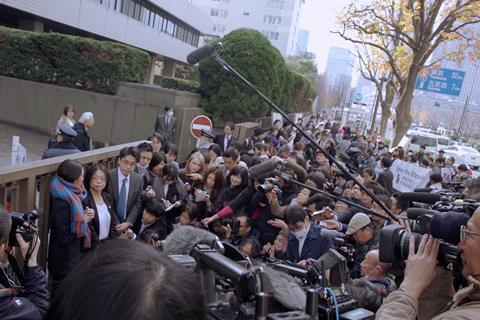A survivor of a 2015 sexual assault, Shiori Ito chose to tell her own story with her film Black Box Diaries. She tells Screen why it was vital to shine light on her life’s darkest moment.

When journalist Shiori Ito began capturing the footage that has ended up in her Oscar- and Bafta-nominated documentary Black Box Diaries, it was not her intention to bring the material to the screen. A survivor of sexual assault by a senior Japanese newspaper journalist in 2015, Ito chose to chronicle her pursuit of justice “purely for protection reasons” over the first two years, she explains.
Japan’s legal system kept proving inadequate, starting with difficulties making a report — she was forced into a re-enactment with a life-sized doll — and continuing as the police investigation into her attacker, a fellow journalist closely allied to then-prime minister Shinzo Abe, petered out.
“I felt like I needed to gather all these materials of a possible cover-up by police and just to make sure that there was no power involvement,” she says. “But then when the arrest was cancelled and the case was dropped, I decided to ask to reopen the case. And I went public, hoping other journalists would join the conversation to be able to maybe ask questions of these top police, to ask difficult questions that I couldn’t even ask or couldn’t get an answer for.”
“But then I realised they’re still difficult questions to ask, or a difficult story to cover,” she continues. “So I decided, ‘Okay, I know it’s sort of crossing a line as a journalist, but maybe I want to keep filming.’ At that time I was already making documentary films about other people as a journalist, so I thought this is something I can do.”
Black Box Diaries charts a harrowing journey by Ito, balancing the impact both of the assault and of bravely naming former Tokyo Broadcasting System Washington bureau chief Noriyuki Yamaguchi as her attacker in 2017, allegations he has consistently denied.
Under Japanese law at the time, lack of consent was not sufficient grounds for rape. Ito was derided and trolled for speaking about what happened, filing a civil suit when the police declined to recommence criminal proceedings, fighting against the archaic legislation and raising awareness that the taboo nature of talking about sexual assault in Japanese society results in a mere 4% of attacks being reported.
As the documentary’s director, Ito does not hold back from depicting what she needs to, such as her own vulnerability, evident in her personal to-camera recordings. That said, she ensured no sexual violence was shown. “It was very important to control that part. I didn’t want anything that was visually traumatising,” she says. “I’m happy I had control for that as a director.”
Telling her tale herself, rather than entrusting it to another filmmaker, was not an easy decision. Ito had already committed the experience to paper in her 2017 book Black Box.
“At the time when I started sharing my story with the public, I felt that as a journalist I shouldn’t talk about or cover my own story,” explains Ito. “I did as much as I could, I tried to answer all the interviews, but then often what I wanted to tell is edited and cut out, and I felt powerless.”
Taking control

By stepping up to direct Black Box Diaries, Ito retained final say on what was depicted — and how. There are no re-enactments; viewers witness black-and-white CCTV footage of her arrival via taxi with Yamaguchi at a Tokyo hotel, intoxicated, unable to stand and dragged inside by him.
“I also wanted to see a film from the survivor perspective — to show it’s possible to tell our own stories,” she adds. Ito likens putting together the feature, with co-producer Ema Ryan Yamazaki editing, to “a very hardcore therapy session, in a way. I had to revisit more than 400 hours of footage of the part of my life that I wish I can forget.”
The kindness of strangers, London-based Swedish journalist Hanna Aqvilin chief among them, assisted in pushing along Black Box Diaries. Amid the backlash to Ito disclosing her story, Aqvilin reached out with a Japanese friend to advise that Ito could stay at one of their houses.
“I didn’t know them, but I decided to jump on the offer because I felt like I needed to breathe,” she recalls. “And it was difficult, I was always hiding here in Tokyo. So I said yes and I moved to the apartment. That was the moment that I could finally talk about this issue openly and realised this is something that we need to ask more, to question more, to cover more.”
After Black Box on the page, Ito participated in Japan’s Secret Shame for the BBC, collaborating with Aqvilin, who became one of Black Box Diaries’ producers and cinematographers. Capitalising on their respective experiences in short documentaries and working with UK production company True Vision, the focus was directed more towards the broader situation in Japan.
Bringing Black Box Diaries to fruition across eight years stemmed partly from being able to share some of that footage and gather a team. “Then after that, it was all from our pocket,” explains Ito. “The first financial support came actually after we went into the post-production phase.” New York’s Cineric Creative and Tokyo’s Star Sands joined Ito and Aqvilin’s Hanashi Films on the documentary.
Encouraging dialogue
The feature’s 2024 Sundance premiere kicked off a tour of “around 50 different film festivals and more than 30 different countries”, Ito notes, and helped lead to its US release via MTV Documentary Films and UK bow from Dogwoof, both in October. A slew of nominations, including at the Cinema Eye Honors Awards and International Documentary Association Awards, has culminated in the validation of Bafta and Oscar nods.
Post-#MeToo, audiences around the world have taken notice. The film is unflinching about the struggles for survivors and for women in Japan, plus the systems of power behind that status quo, but Ito considers Black Box Diaries a love letter to her country, encouraging dialogue about crimes that are still so rarely discussed while striving to spark change for generations to come. At screenings abroad, Japanese women in particular have been responding strongly.
“I’ve been meeting many Japanese women outside of Japan who came to our film screenings sharing similar stories and telling us that it’s difficult to have the life that you want back in Japan,” she says. “And I feel like this is our loss, because they are very talented, multilingual, amazing women who don’t feel they can find the same quality of life or recognition of their work back here.”
While Ito hopes the global awards attention will help secure a Japanese release, helping theatres feel comfortable playing the film without fear, Black Box Diaries resonates with viewers from all backgrounds. “Through sharing this film, I was able to ask other audiences, ‘What’s in your black box? Do you see any black boxes around your society?’ And that’s been an exciting way to share how can we talk about or open up black boxes.”
For her next project, Ito will be happy to remain behind the lens. “Next is just to be able to make a new film about someone else.”






![The Brightest SunScreen[Courtesy HKIFF]](https://d1nslcd7m2225b.cloudfront.net/Pictures/274x183/3/5/0/1448350_thebrightestsunscreencourtesyhkiff_312678.jpg)


















No comments yet